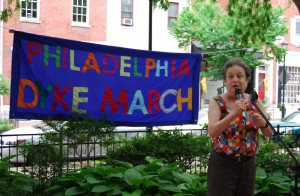This week marks the one year anniversary of PA State Representative Mike Fleck (R-81) coming out as openly gay. His courage, strength, and grace while coming out and being out have had a profound impact on countless Pennsylvanians, rural youth, and people around the world. However, Rep. Fleck was ready to come out much earlier than December 2012.
In the December 6th issue of the Philadelphia Gay News,
Rep. Fleck shares publicly for the first time that the Gay and Lesbian Victory Fund instructed him to stay in the closet when he reached out to them. The Victory Fund is the premier national organization dedicated to electing out LGBT people to public office. As a young Pennsylvanian and President of a rural GSA, I find their treatment of Rep. Fleck highly problematic and indicative of a larger framework
that separates the LGBT political elite from local leaders who happen to be LGBT.
Coming out is a very personal process. Above all else, it is important that the person who is doing so maintain control of how events unfold. Rep. Fleck’s long journey of understanding who he is took several years. By the spring of 2012, he was ready to come out. His close political advisors, including former Republican National Committee Chairman Ken Mehlman, encouraged him to come out before the summer. However, a friend of Rep. Fleck’s suggested he reach out to the Victory Fund for their strategic counsel.

Rep. Brian Sims Speaks at a Victory Fund Event (Credit: Out Smart Houston)
The Victory Fund had a very strong incentive to keep him closeted until 2013, or to delay his coming out as much as possible. One of their campaign board members, Mr. Brian Sims, was running on the explicit platform of being the first openly gay state legislator in Pennsylvania. There is a clear conflict of interest on the Victory Fund’s behalf: If Rep. Fleck, a highly popular third term legislator, were to come out before 2013, he would be “taking away the title” from Mr. Sims. Not only would this hurt his personal ego, but also bruise the fundraising power of the Victory Fund on Mr. Sims’ behalf. Through his position, Mr. Sims has regularly stumped for the Victory Fund at private fundraisers, and once told Houston’s Out Smart, “I am an absolute junkie for the Victory Fund”.
If Mr. Sims secured the full title of “first openly gay legislator in PA,” the organization would have amplified media presence after “their guy” won. The Victory Fund could claim credit for prevailing in what they call on their website, a “Horizon State.” But, if Rep. Fleck came out before the election, they would lose recognition for supporting the first openly gay legislator in Pennsylvania.
To this day, Rep. Sims presents a media image as though he were the first openly gay legislator in the state, and is still regularly mischaracterized in the media as such (1-4). Not coming out to gain some
historic title, Rep. Fleck is humble and has never publicly asserted a need to correct them.
The Victory Fund played Rep. Fleck. He finally broke under the pressure and came out on his own terms on December 1, 2012 through the Hungtindon Daily News. Upon coming out, Rep. Fleck received nasty attacks from Mr. Sims’ supporters for ‘stealing his crown.’ On PoliticsPA, one Sims’ supporter wrote that “[Rep. Fleck is] swooping in and stealing all his thunder [which] reeks of opportunism and some cowardice…way to hedge your bets then take advantage.” All because he made a personal decision stop following the problematic advice of just ‘waiting’. At the time, Rep. Fleck most likely had no idea or did not care who Mr. Sims even was.
So why would an experienced national organization dedicated to electing LGBT people to public office tell a legislator to stay in the closet? Their reasoning with Rep. Fleck was likely regarding the nature of his conservative district and not wanting him to “risk” his seat. Rep. Fleck was re-elected twice with 100% of the vote and was already expected to sail to victory again without any formal challenger. The primary election already happened in April, so the only way to challenge Rep. Fleck would have been in the form of a write-in candidacy. In a rural district against a well-liked incumbent, the amount of resources needed to run a successful write-in campaign in only a few months would likely be cost-prohibitive. In asking for him to wait until after the election, it opened the door to some of his constituents thinking that he was ‘deceiving them’ until after election day. Did the Victory Fund plan on asking him to stay in the closet through 2013?
 The Victory Fund’s base of supporters is largely built from cocktail parties and black-tie events which speak to the non-profit industrial complex. To survive in difficult economic times, when many LGBT organizations have shuttered, the organization may be drawn toward tactics of self-preservation over maintaining the integrity of their mission.
The Victory Fund’s base of supporters is largely built from cocktail parties and black-tie events which speak to the non-profit industrial complex. To survive in difficult economic times, when many LGBT organizations have shuttered, the organization may be drawn toward tactics of self-preservation over maintaining the integrity of their mission.
Their matrix for endorsements and providing financial support is not based primarily on the importance of a race, but rather if they are guaranteed or near-guaranteed to win. It seems they want to keep their ratio of winners high, which can allow them to share a high rate of success with their donors. They tout on their website: “In fact, more than 350 openly LGBT candidates ran for office in 2010, but just 164 earned Victory’s endorsement. And 65% of those individuals went on to win their election.” This strategy is successful, as the Movement Advancement Project found the Victory Fund, along with several other national LGBT organizations, increased their profits by 17% in 2012. They have little reason to support grassroots candidates who would not return the Victory Fund’s investment by drawing wealthy crowds to their cocktail fundraisers, as would someone from within their inner circle.

PA Rep. Candidate Fern Kaufman
Under these parameters, Harvey Milk would not get support from the Victory Fund even if he tried – at least not during his first attempts running for City Supervisor. However, those elections were necessary to get his name out there and eventually win. There are countless examples of important campaigns to elect LGBT people that fell outside the mainstream political community. In a special election earlier this year, Equality Pennsylvania declined to support out Republican Bryan Tate for an open seat in York County in order to endorse now-Rep. Kevin Schreiber, a Democrat. In 2008 and 2010, out lesbian Fern Kaufman ran for state representative against an incumbent Republican in Chester County. She became the earliest serious contender to take the title of first LGBT person in the Pennsylvania legislature – in 2008 she secured 48% of the vote. Advocates would like to think that since she was running in a Philadelphia suburb, the larger LGBT community and the Victory Fund would have been at her side. But they were not, and she slammed them in the Philadelphia Gay News after her loss in 2010:
“I actually had to fight with my own community for this. I don’t know if I can take on another uphill battle when my community was not there for me,” she said. “That’s a harsh statement to make, but they weren’t. It was sporadic, and I had to fight for them to pay attention but, by and large, they did not. It’s one thing to say, ‘We really support you,’ and slap me on the back and say, ‘Go, girl, you’re great.’ That’s great, but I need people who are actually willing to put rubber to the road because this isn’t something that can be done alone. I don’t know if I have that fight in me again to go back to the community and try to get them to actually show up.”
“Our community needs to take stock of what’s really important to them, and I hope, if nothing else, this election will open up a greater conversation about politics in our country and our community.”
Conversely, many LGBT New Yorkers saw City Council President Christine Quinn’s recently failed bid for Mayor as a victory. They believed she had become corrupt and sold out the queer community in numerous instances, including by supporting the Stop and Frisk program. The Washington Blade reported that:

New York Mayoral Candidate Christine Quinn Speaks at a Victory Fund Event (Credit: Metro Weekly)
“The national LGBT groups Human Rights Campaign and Gay and Lesbian Victory Fund contributed thousands of dollars to her campaign and dispatched volunteers and field organizers to help in locations throughout the city.
Victory Fund President and CEO Chuck Wolfe issued a statement Tuesday night noting that eight of its 10 endorsed candidates in New York races, including City Council candidates, won their races in the New York primary.”
The Victory Fund, and other LGBT political elite organizations, have an incentive to perpetuate a culture that keeps them close to elected officials in power, who can raise them funds and keep their message relevant. Of the 21 board members listed on their website, 14 are older white cis-men. When LGBT political communities are led by individuals from privileged classes, they are likely to be also designing an agenda for their own needs.
So, what is the value in analyzing Rep. Fleck’s experience with the Victory Fund? In writing this, I asked myself: is it worthwhile to provide constructive criticism of a national LGBT organization so publicly? I believe it is critical for us to recognize this behavior when it occurs because there are serious implications for the integrity and purpose of the LGBT movement. In this system, LGBT dollars have and will continue to go to privileged gay leaders entering politics who come from the inner circles of organizations such as the Victory Fund or HRC. It seems the Victory Fund may have lost their sight of their mission when telling our state’s first openly gay state representative to sit down. It was never their place to make that call. We must challenge these institutions and hold LGBT political leaders accountable so we may promote a movement that fights for the justice of all people.
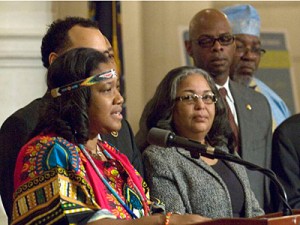
Rep. Vanessa Lowery Brown Speaks to the Press After House Floor Debacle (Credit: Philadelphia Inquirer)
In the end, while both Rep. Fleck and Rep. Sims were elected, what has happened? It seems rather misguided to have quelled Rep. Fleck in coming out while over-promoting Rep. Sims given evidence of their effectiveness in the legislature. Rep. Sims has not made any earth-shattering progress on LGBT issues in the House. He staged a debacle with Rep. Daryl Metcalfe on the House floor over DOMA in June, and has held several inflated press conferences. It would have been common knowledge to all legislators that members of the majority party have the power to silence any legislator in the minority from speaking about a controversial issue during a unanimous consent forum. He was present in session on February 13, when several black legislators were silenced when they went to speak about Black History Month on the House floor. Likewise, marriage equality bills have been introduced six times before he and Rep. McCarter did so, without fanfare. In contrast, Rep. Fleck used his resources to gain the acceptance of a majority of his Republican colleagues – and foster strong relationships with major political players so our GOP majority state government can start to move forward on equality issues.
On the heels of the 35th anniversary of Harvey Milk’s assassination, I think it is important to remember that he once called out:
“It’s not about personal gain, not about ego, not about power… it’s about the “us’s” out there. I have never considered myself a candidate. I have always considered myself part of a movement. I think that there’s a distinction between those who use the movement and those who are part of the movement.”
Harvey Milk, Fern Kaufman, and Rep. Fleck are among a select breed of out leaders who have refused to be bought or sold by the LGBT political elite. Perhaps this is why wealthy LGBT organizations have been making calculated decisions for decades such as the one to stall Rep. Fleck coming out.
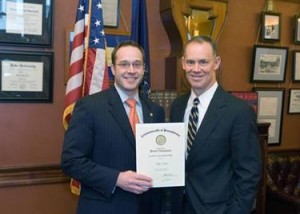
Rep. Mike Fleck and PA House Majority Leader Mike Turzai
If the LGBT political establishment keeps themselves limited to investing only in their golden boys of the Horizon States, there will never be a true win. Rep. Fleck was clear in his interview that he “didn’t want to be some big poster boy for gay rights,” but rather focus on being a successful legislator, and by virtue of being out, help the movement. The red states, as well as Pennsylvania, will not all of the sudden become LGBT safe havens. We must rally with all out legislators, including conservatives, who may be outside the established LGBT community.
When the larger LGBT community can break down the barriers between the grassroots and establishment communities, we will have secured the truest victory: the building of a world where everyone is provided respect, dignity, and equality.
1. Philebrity: Q&A: Rep. Brian Sims, PA’s First Openly Gay Legislator, On The Day That DOMA Died (June 26, 2013)
2. We’re not done yet. What’s next in the fight for LGBT rights (September 16, 2013)
Rep. Sims opens his opinion piece for The Guardian with:
“As the first openly gay representative in Pennsylvania, I’m confident civil rights for all will win despite more legal challenges.”
3. Your Erie.com: State Rep Brian Sims Visits Erie (November 2, 2013)
4. Campus Pride Speakers Bureau Profile: Brian Sims
Post Photo Credit: The New York Times


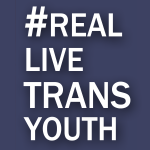
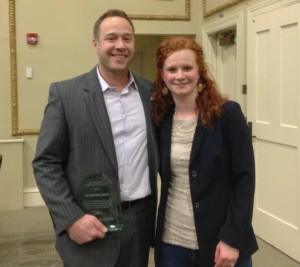
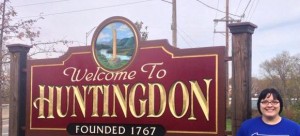

 The Victory Fund’s base of supporters is largely built from cocktail parties and black-tie events which speak to the non-profit industrial complex. To survive in difficult economic times, when many LGBT organizations have shuttered, the organization may be drawn toward tactics of self-preservation over maintaining the integrity of their mission.
The Victory Fund’s base of supporters is largely built from cocktail parties and black-tie events which speak to the non-profit industrial complex. To survive in difficult economic times, when many LGBT organizations have shuttered, the organization may be drawn toward tactics of self-preservation over maintaining the integrity of their mission.



